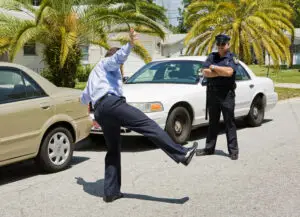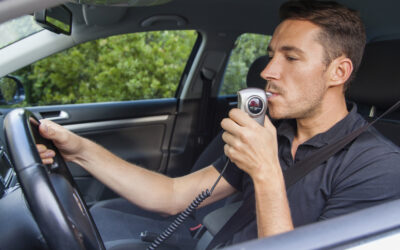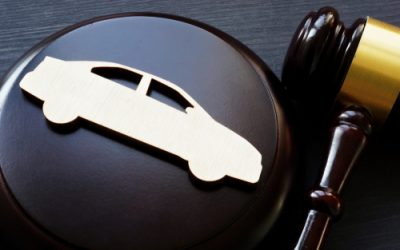
In California, you are not obligated to undergo a field sobriety test. Your involvement is entirely voluntary, and the outcomes could negatively impact your defense against DUI charges. Therefore, it’s better to refuse a field sobriety test.
If you have been arrested for DUI, with or without field sobriety testing, you must speak with a Los Angeles DUI lawyer to protect yourself. Continue reading to learn what to do if you get pulled over for suspected DUI.
What You Need to Know About Field Sobriety Tests in California
Every driver in California should have a fundamental understanding of what a field sobriety test entails. A typical field sobriety assessment comprises three segments:
- Horizontal gaze nystagmus: The officer will ask you to track a mobile object with your eyes. If your eyes exhibit jerky movements during this task, it may suggest intoxication from alcohol, drugs, or a combination of both.
- Walk-and-turn: The walk-and-turn test involves walking heel-to-toe for a certain number of steps. This test checks your physical coordination, which can drop if intoxicated.
- One-leg stand: During the one-leg stand test, you must balance on one leg for a set amount of time.
While some individuals may struggle with these field sobriety tests even when sober, others might perform adequately despite being under the influence of alcohol. Therefore, relying solely on these tests to gauge intoxication levels can be unreliable.
However, while the science and logic behind field sobriety tests are shaky, the law is not. They can be used against you. The most important thing to remember about field sobriety tests in California is that your participation is voluntary.
Nystagmus (Involuntary Eye Movements) Has Many Causes
Nystagmus is a relatively common condition, but its presence can be used against you in a DUI conviction. And that’s one more reason why refusing a standardized field sobriety test in California is better.
Nystagmus, an involuntary eye movement, is the first test given during a field sobriety test. It is extremely unreliable. Nystagmus can be an inherited condition. People may also experience it after a stroke or an ear infection. Emerging medical research also links nystagmus to COVID-19.
The Physical Portions of a Field Sobriety Test Measure Athletic Ability – and Not Much Else
Older individuals and people with certain health conditions are at a serious disadvantage. Countless medical conditions affect a person’s balance, including:
- High or low blood pressure
- Inner ear problems
- Low blood sugar
- Pregnancy
If a person has any issues with their hips, knees, ankles, or feet, they may not “pass” the walk-and-turn or one-legged stand tests. Even people with average fitness can struggle with standing on one leg in the comfort of their homes, much less the side of the road.
Why Do Police Request Field Sobriety Tests if They Are Voluntary?
It’s in your best interest to politely refuse a field sobriety test. Law enforcement can’t arrest you just for refusing to do a field sobriety test, but they can still arrest you for suspicion of DUI.
If an officer has probable cause that you’re drinking and driving, they can still arrest you – but they won’t need field sobriety test results to “prove” your intoxication. Once you’ve been arrested, California law requires you to submit to a breathalyzer, regardless.
So, what is the point of field sobriety tests? These roadside tests are nothing more than icing on the cake for the prosecution. The results will only hurt your defense and bolster the prosecution’s case against you. You should refuse to take a field sobriety test.
Five Things You Should Do When Stopped for Suspicion of Drunk Driving
Now you know that it is better to refuse a field sobriety test. But what should you do if stopped for a DUI? Here are the five steps you should take.
1. Prepare for the Officer Interaction
Pull over to the side of the road and roll down your window, then place your hands on the steering wheel and keep them there. Don’t leave your car unless the police officer asks you to do so.
You cannot refuse to show ID to officers in California. If you are asked to get your license or insurance papers, tell the officer where they are and ask permission to get them. For example, “My license is in my purse. Can I get it out?”
2. Don’t Answer Leading Questions
Likely, the first thing that the law enforcement official will ask you is, “Do you know why I’m pulling you over?” This question is a trap. Whatever you do, don’t start guessing at their reasons! A simple “No, I do not know why” is sufficient.
Another question they may ask you is, “How much have you had to drink tonight?” You don’t have to answer that question, but you shouldn’t lie. You can politely respond, “I prefer not to answer any questions. Am I free to go?”
The officer pulled you over for a reason, so you probably won’t be able to go at this point. But this response lets the officer know you know your legal rights.
3. Refuse a Field Sobriety Test
You should refuse to take a field sobriety test. You can say, “I prefer not to participate.” The police may continue asking you questions, but stay calm and polite. Continue to say, “I prefer not to answer any questions, officer. Can I go now?”
4. Know California’s Preliminary Alcohol Screening (PAS) Laws
If you are not under arrest, law enforcement may ask you to take a breathalyzer test on the spot, called a preliminary alcohol screening (PAS). In California, unless you are under 21 years of age or on DUI probation, you can refuse the PAS – and you should.
A PAS test is far from foolproof. The portable, handheld devices used for a PAS may not be calibrated correctly, and certain health conditions, like diabetes and GERD, can discredit PAS breath test results.
Much like a field sobriety test, the results of a PAS will be used against you but won’t help your DUI defense. If there is any doubt about whether you are in police custody, ask, “Am I under arrest?”
5. Know Your Rights if the Police Arrest You
If the police believe they have enough evidence to arrest you for suspected DUI, then the laws for testing change. California law requires you to submit to a breath, alcohol, or urine test to measure your blood alcohol concentration after arrest.
It is in your best interest to take this test after your arrest, as you will face separate penalties just for refusing, regardless of what your BAC is. After an arrest, take the breathalyzer test and continue to invoke your right to remain silent. Ask to speak with a defense attorney.
Get Legal Help After a California Field Sobriety Test
Is it better to refuse a field sobriety test or not? You should politely decline! The results will be used against you. If you did do a field sobriety test, you should contact us to speak with a Los Angeles DUI attorney who will work to defend you.
Immediate legal representation is your best defense against a DUI charge, so do not wait to partner with one of our experienced and aggressive defense lawyers.






